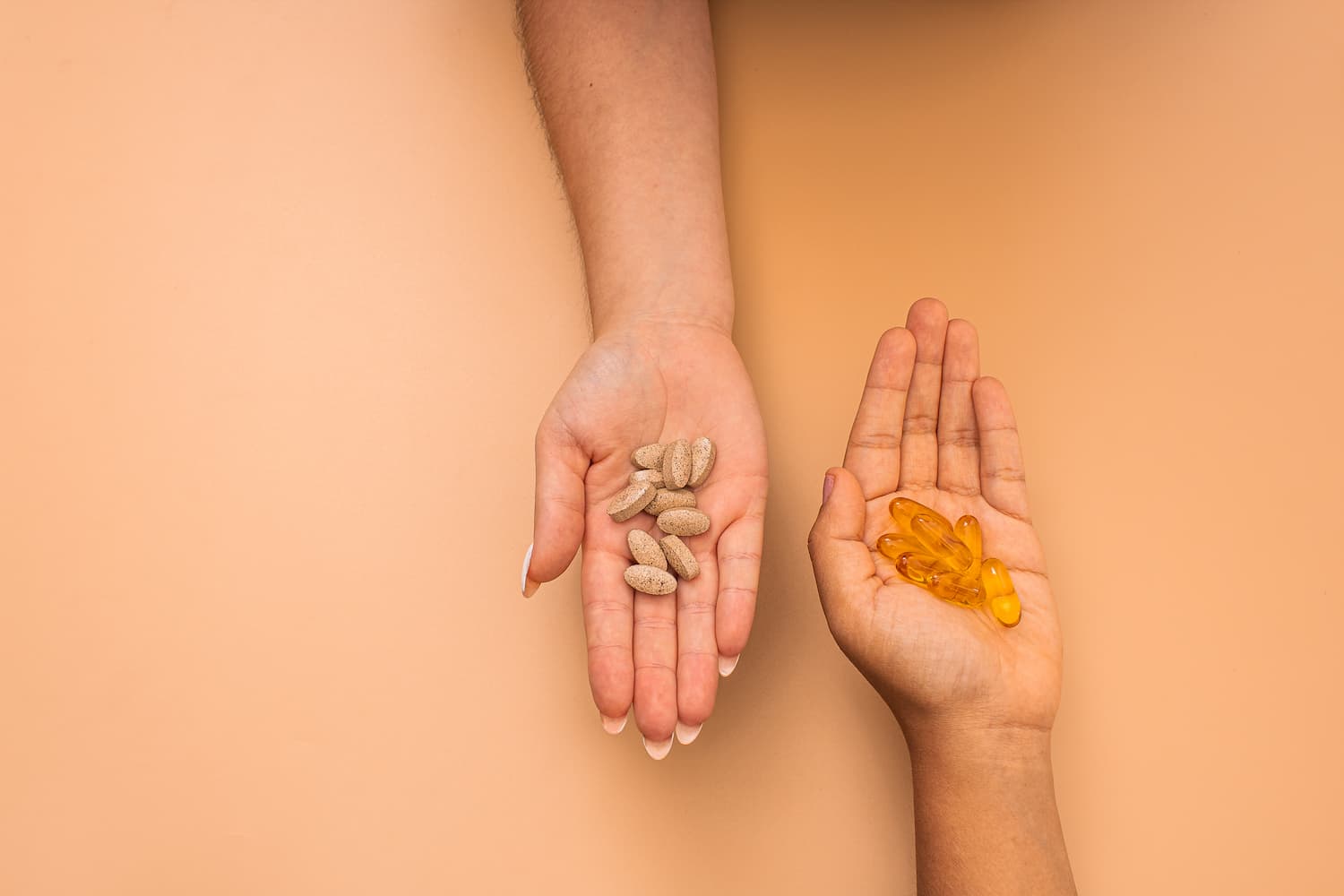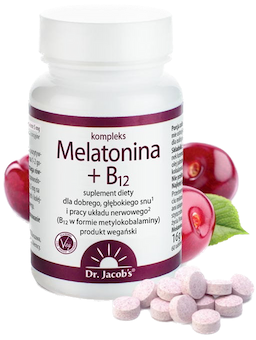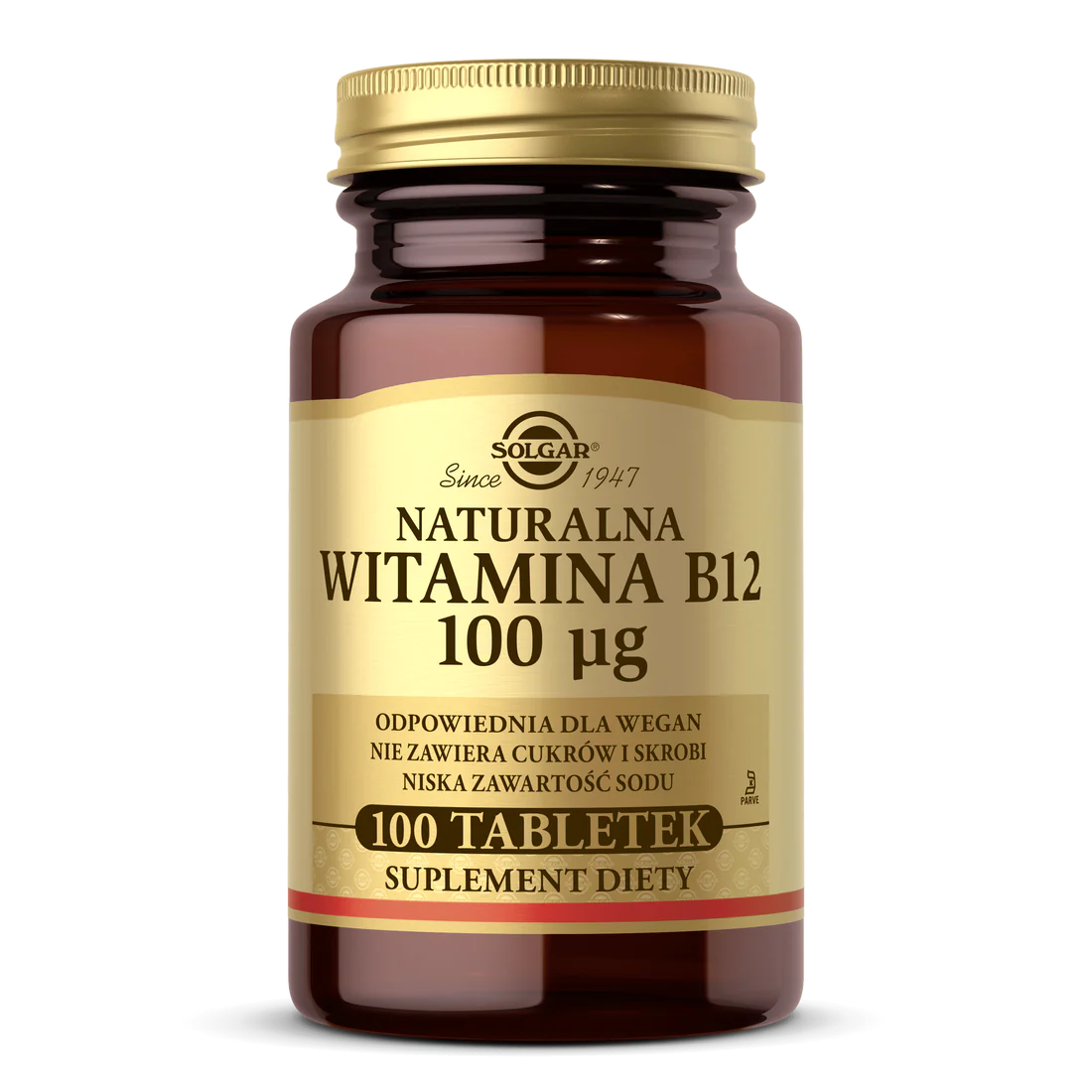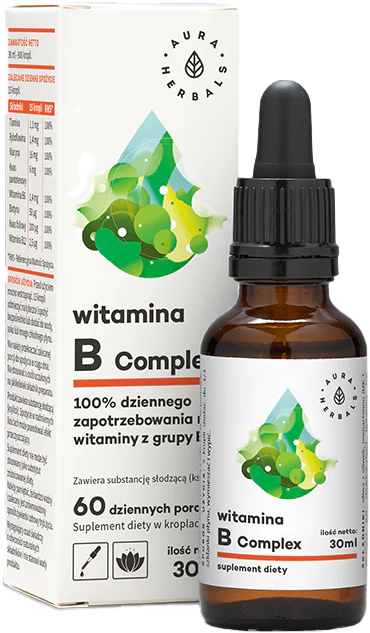How do you make up a vitamin B12 deficiency quickly? Advice from a nutritionist
The clinical nutritionist shows how to make up for vitamin B12 deficiency and the best sources of vitamin B12.


Learn more about our editorial process
.

Learn more about our editorial process
.

Learn more about our editorial process
.

Learn more about our editorial process
.
Why you can trust us
Articles on Natu.Care are written based on scientific research, data from government websites and other reliable sources. The texts are written in cooperation with doctors, nutritionists and other health and beauty experts. Articles are reviewed before publication and during significant updates.
.Learn more about our editorial process
.Information about advertisements
Content on Natu.Care may contain links to products from the sale of which we may receive a commission. When creating content, we adhere to high editorial standards and take care to be objective about the products discussed. The presence of affiliate links is not dictated by our partners, and we select the products we review ourselves completely independently.
.Learn more about our terms and Conditions
.It has happened. You hold the test results in your hands - you have a vitamin B12 deficiency. You want to say goodbye to this condition and its unpleasant symptoms as soon as possible.
Unfortunately - you can quickly get nauseous from making up for this deficiency by eating liver for breakfast, lunch and dinner.
I have a better idea - perhaps the question should be: how do you effectively make up the deficiency and not allow it again? Together with clinical nutritionist Aleksandra Cudna, we will advise you on how to supplement vitamin B12 deficiency in a healthy and long-lasting way.
From this article you will learn:
.- How to supply your body with vitamin B12 from your diet.
- How to get vitamin B12 from your diet.
- How to consume vitamin B12 supplements so that they work.
- How to take vitamin B12 supplements.
- How to know if you have a vitamin B12 deficiency. .
- How much vitamin B12 per day do you need. .

Odkryj, co dla Twojej urody może zrobić Natu.Care Glow Stories
Skóra, włosy, paznokcie: Glow Stories
Wesprzyj prawidłowy stan skóry, włosów i paznokci i ochroń komórki przed stresem oksydacyjnym!
Sprawdź cenę
Glow Stories to formuła aktywnych składników, które zostały starannie dobrane wedle najnowszych badań naukowych. Znajdziesz w nich biotynę, cynk i miedź pielęgnujące zdrowie włosów i promiennej cery. Ponadto cynk jest odpowiedzialny także za zachowanie zdrowych paznokci. Mądra suplementacja zadba o Twoje piękno od środka.Julia Skrajda, dietetyk kliniczny
See also:
.
Vitamin B12 in a pill
.
Vitamin B12 (cobalamin) is one of the B vitamins. It is essential for the normal functioning of many processes in the body such as red blood cell production, nervous system function, metabolism, cognitive ability and immune system functionand.
The body is unable to produce it, so you must supply it from food. The best sources of vitamin B12 are animal products and in particular offal .
How to replenish vitamin B12 deficiency quickly?
.
To quickly supplement vitamin B12 deficiency, consume animal products: meat, poultry, fish, eggs and dairy. Mussels have the highest amount of vitamin B12 - they contain up to 90 µg. People on a plant-based diet should supplement vitamin B12 from dietary supplements at a dose of 2.4 µg per day.
To make up for a vitamin B12 deficiency, you need to increase the amount of vitamin B12 in your diet or consider supplementation. It's simple, but it won't work if you suddenly start being on a strict meat diet or buy a mega-giga-max-B12 supplement and cyclist, after the problem.
Blockquote doses will not immediately raise vitamin B12 concentrations, it takes time to do so. And sudden, drastic changes in diet, such as a significant increase in meat if there has been less of it up to now, can cause gastrointestinal complaints.
 .
.
Alexandra Cudna Clinical nutritionist
It's time to make changes to your diet and lifestyle so you don't have any more vitamin B12 deficiency problems.
What to do? Below is a checklist with an action plan.
- Take a blood tests for vitamin B12 levels and check how much deficiency there is.
- Consult your doctor about whether your deficiency requires dietary supplements or medication. .
- Check out the best sources of vitamin B12 and choose the most nutritious ones for you.
- If your doctor has recommended supplementation, take it daily - regularity is key to your body's health.
- Climit stimulants (cigarettes, alcohol, coffee), which reduce the absorption of vitamin B12. .
- Schedule a test of vitamin B12 concentrations after 3 months of treatment.
How long does it take to supplement vitamin B12 in the body?
.
How long it takes to supplement vitamin B12 in the body depends on the extent of the deficiency and can be several or several weeks. The key is to provide this vitamin from food or to systematically take dietary supplements, or prescription drugs with vitamin B12.
Consult your doctor, who can best assess how much vitamin B12 you need and when to do a follow-up test.
Storage of vitamin B12 is accumulated in the liver and can last for 2-5 years. After this time, in the absence of dietary sources of B12, the body may start to signal that its reserves are running out. Therefore, changing to a vegan diet will not immediately cause symptoms due to a deficiency of this vitamin..
 .
.
Alexandra Cudna Clinical nutritionist
How to improve the absorption of vitamin B12?
.
To improve the absorption of vitamin B12, it is worth taking it with folic acid (vitamin B9), pyridoxine (vitamin B6) and biotin (vitamin B7). A good option is to buy b complex vitamins. Vitamin B12 bioavailability can also increase vitamin A or calcium.
What to eat for vitamin B12 deficiency?
.
When deficient in vitamin B12, it is recommended to eat foods naturally rich in this vitamin - especially lamb, poultry and pork liver. These meats contain (depending on origin and processing) 18-85 micrograms of vitamin B12, and a 100g serving covers the daily requirement.
But that's not all that's worth having on the menu. If you're a foodie, check which sources of this vitamin you'll enjoy the most. Which products contain vitamin B12and?
Animal sources of vitamin B12
. .
|
Source . |
Quantity of vitamin B12 in 100 g . |
|
Meal |
90 µg |
|
lamb liver |
85 µg |
|
Pork liver |
26 µg |
|
Poultry liver |
18 µg |
|
tuna |
10.9 µg |
|
sardines |
9 µg |
|
rainbow trout |
7.5 µg |
|
Beef |
5.8 µg |
|
blood |
2.8 µg |
|
camembert |
1.3 µg |
|
hen's eggs |
1.1 µg . |
|
fortified milk . |
1 µg |
|
cheddar |
0.89 µg |
Animal foods are rich in a well-absorbed form of vitamin B12 and effectively supplement it in the diet..
 .
.
Alexandra Cudna Clinical nutritionist
Important
The bioavailability (bioavailability) of vitamin B12 from the above products varies. Vitamin B12 is absorbed approximately 50-90% from meat, 30-42% from fish 9-36% from eggsand.
Vitamin B12 bioavailability also depends on the condition of the gastric mucosa, medications taken (e.g. metformin, antacids, hormonal contraception) and known medical conditions (e.g. SIBO, coeliac disease) .
.
Vegetable or other sources of vitamin B12
. .
|
Source . |
Quantity of vitamin B12 in 100 g . |
|
fortified yeast |
117 µg |
|
fortified cereal flakes |
Depending on manufacturer 6-21 µg . |
|
fortified vegetable beverages |
depending on the manufacturer, on average 0.4 . |
The nice thing is that you can buy fortified (i.e. enriched) products with vitamin B12. The most common are breakfast cereals, bars and plant-based drinks. However, they are not 'packed' enough with vitamin B12 to be sufficient to cover your daily requirement.
You would need to eat about 300g of Corn Flakes (from Gluten Free) or drink about 600ml of sugar-free almond milk (from Alpro).
It is estimated that you are able to get around 0.2-0.5 µg of vitamin B12 per day from fortified products, which is far too littleand.
.
In which fruits is vitamin B12 present?
.
Vitamin B12 is not found in fruit and vegetables. The best sources of vitamin B12 are animal foods. However, remember to still make room every day for fruit and vegetables, which may not contain cobalamin, but are a source of other vitamins, minerals and valuable fibre.
Important
Alcohol interferes with the absorption and storage of vitamin B12. It hinders the absorption of supplementation and can exacerbate deficiencies. Do not drink alcohol, especially if your blood tests have shown you to be vitamin B12 deficient.
Which vitamin B12 supplement to choose?
.
If you cannot get vitamin B12 from your diet - consider supplementation. Ilona Krzak, MSc in pharmacy, advises on what to look for when choosing a product.
Form of vitamin B12
.
Choose methylcobalamin or cyanocobalamin, as they are best absorbed in the body.
Some dietary supplements contain edible blue-green algae (cyanobacteria), which usually have "pseudo-vitamin B12" in the formulation. This form is inactive in humans and will not work.
 .
.
Ilona Krzak Master of Pharmacy
.
Dosage
.
One pill with an impactful dose? Sounds tempting, but... no. The key is to consume vitamin B12 systematically, preferably in several smaller daily doses.
There is a vitamin B12 transport factor in our body of which we have a limited amount. It makes no sense to ingest a large dose at once, as we will absorb as much as this internal factor will allow..
 .
.
Ilona Krzak Master of Pharmacy
Dr Jacob's Melatonin + B12

- Active ingredients: melatonin, vitamin B12
- Form: sucking pastilles .
- Dosage: 1 lozenge per day .
- Sufficient for: 60 days .
Product description
Sweet pleasures in the evening are rather forbidden. Well, unless it's cherry lozenges with melatonin and vitamin B12, whichóre going to improve the quality of your sleep.
One tablet in the evening will shorten your sleep time and stop you waking up.
One tablet in the evening will shortenóyour time to fall asleep and stop you waking up during the night. The addition of vitamin B12 will improve the functioning of the nervous system, making you even better rested.
The following tablets will help to improve the quality of your sleep.
Pros and cons
Sweet pleasures in the evening are rather forbidden. Well, unless it's cherry lozenges with melatonin and vitamin B12, whichóre going to improve the quality of your sleep.
One tablet in the evening will shorten your sleep time and stop you waking up.
One tablet in the evening will shortenóyour time to fall asleep and stop you waking up during the night. The addition of vitamin B12 will improve the functioning of the nervous system, making you even better rested.
The following tablets will help to improve the quality of your sleep.
Additional information
Sweet pleasures in the evening are rather forbidden. Well, unless it's cherry lozenges with melatonin and vitamin B12, whichóre going to improve the quality of your sleep.
One tablet in the evening will shorten your sleep time and stop you waking up.
One tablet in the evening will shortenóyour time to fall asleep and stop you waking up during the night. The addition of vitamin B12 will improve the functioning of the nervous system, making you even better rested.
The following tablets will help to improve the quality of your sleep.
User review
Sweet pleasures in the evening are rather forbidden. Well, unless it's cherry lozenges with melatonin and vitamin B12, whichóre going to improve the quality of your sleep.
One tablet in the evening will shorten your sleep time and stop you waking up.
One tablet in the evening will shortenóyour time to fall asleep and stop you waking up during the night. The addition of vitamin B12 will improve the functioning of the nervous system, making you even better rested.
The following tablets will help to improve the quality of your sleep.
SOLGAR natural vitamin B12

- Active ingredients: vitamin B12
- Form: tablets .
- Packaging: 100 tablets .
- Dose: 1 tablet daily .
- Sufficient for: 100 days .
Product description
The dietary supplement is a source of valuable vitamin B12 in a form that is easily absorbed by humans - cyanocobalamin. This biologically active form of vitamin B12 has many very important protective functions for the body.
Vitamin B12 supports the functioning of the immune system. It also contributes to reducing feelings of fatigue and tiredness. Its important function is also to take part in the metabolism of homocysteine, an amino acid thatós naturally formed in the human body.
Vitamin B12 is a very important protective function.
Pros and cons
The dietary supplement is a source of valuable vitamin B12 in a form that is easily absorbed by humans - cyanocobalamin. This biologically active form of vitamin B12 has many very important protective functions for the body.
Vitamin B12 supports the functioning of the immune system. It also contributes to reducing feelings of fatigue and tiredness. Its important function is also to take part in the metabolism of homocysteine, an amino acid thatós naturally formed in the human body.
Vitamin B12 is a very important protective function.
Additional information
The dietary supplement is a source of valuable vitamin B12 in a form that is easily absorbed by humans - cyanocobalamin. This biologically active form of vitamin B12 has many very important protective functions for the body.
Vitamin B12 supports the functioning of the immune system. It also contributes to reducing feelings of fatigue and tiredness. Its important function is also to take part in the metabolism of homocysteine, an amino acid thatós naturally formed in the human body.
Vitamin B12 is a very important protective function.
User review
The dietary supplement is a source of valuable vitamin B12 in a form that is easily absorbed by humans - cyanocobalamin. This biologically active form of vitamin B12 has many very important protective functions for the body.
Vitamin B12 supports the functioning of the immune system. It also contributes to reducing feelings of fatigue and tiredness. Its important function is also to take part in the metabolism of homocysteine, an amino acid thatós naturally formed in the human body.
Vitamin B12 is a very important protective function.
Aura Herbals Vitamin B Complex drops
Product description
Vegan drops with a complex of B vitamins. A daily serving covers 100% of the requirement for these vitamins. B vitamins are important for the proper functioning of the body, especially for the nervous system, metabolism and energy production.
Pros and cons
Vegan drops with a complex of B vitamins. A daily serving covers 100% of the requirement for these vitamins. B vitamins are important for the proper functioning of the body, especially for the nervous system, metabolism and energy production.
Additional information
Vegan drops with a complex of B vitamins. A daily serving covers 100% of the requirement for these vitamins. B vitamins are important for the proper functioning of the body, especially for the nervous system, metabolism and energy production.
And maybe injections?
.
Vitamin B12 injections are only available by prescription. The injection is given intramuscularly or deep subcutaneously. They are prescribed for anemia megaloblastic, neuropathy and acute vitamin B12 deficiency, which can be life-threatening and health-threatening.
How much vitamin B12 per day do I need to consume?
.
Vitamin B12 dosage depends on your age and health status. Check out the current recommendations belowand.
.
|
Age . |
Daily requirement for vitamin B12 . |
|
Infants up to 6 months |
|
| Newborns up to 6 months. |
0.4 µg . |
|
Children from 7 to 12 months |
0.5 µg |
|
Children from 1 to 3 years of age . |
0.9 µg |
|
Children from 4 to 6 years of age |
|
| . |
1.2 µg . |
|
Children from 9 to 12 years of age |
1.8 µg . |
|
Persons over 13 years of age |
2.4 µg . |
|
Pregnant women |
2.6 µg . |
|
Breastfeeding women . |
2.8 µg . |
How do I know if I have a vitamin B12 deficiency?
.
Sclerosis, numbness in the hands or hair loss do not confirm a cobalamin deficiency. They may be indicative of other conditions.
A vitamin B12 deficiency will be confirmed by a blood test. Don't tell from clots or a tuft of hair - ask your GP for a referral.
And what should prompt a referral?
And what should prompt you to get tested?"
.
Symptoms of vitamin B12 deficiency includeand:
- headaches and dizziness, .
- weakness, muscle aches and fatigue, .
- paresthesias (numbness, tingling, burning), .
- ataxia (reduced coordination of movements and difficulty maintaining balance), .
- pallor, .
- weakness, .
- constipation or diarrhoea,
- loss of appetite,
- lack of appetite.
- loss of appetite, nausea, .
- weight loss, .
- distaste disorder,
- disorder of taste,
- disorder of taste.
- stomatitis with ulceration and inflammation, .
- swelling, burning and redness of the tongue, .
- depressive symptoms, .
- disorders of vision, .
- yellowish skin colour, .
- fracture of nails, .
- hair loss, .
- erectile dysfunction, .
See also:
.
- Dietary supplements with B vitamins .
- Blood tests
- Anemia
- Vitamin B1 (thiamine) .
- Vitamin B2
- Vitamin B3
- Vitamin B5 (pantothenic acid)
- Vitamin B6
- Vitamin B9 (folic acid) .
Summary
.
- You will make up for vitamin B12 deficiency by implementing vitamin B12-rich foods or supplementation into your diet.
- Best sources of vitamin B12.
- The best sources of vitamin B12 are animal-derived foods, especially liver, shellfish, fish. .
- It may take several weeks to several weeks of regular intake to correct a vitamin B12 deficiency in the body.
- People on a diet may need to take a vitamin B12 supplement.
- People on a plant-based diet should take vitamin B12 preparations systematically, as plant sources of this vitamin are not active in the body and are not absorbed.
- Treat the deficiency under the supervision of a doctor, do not abuse dietary supplements and do not change your diet drastically. .
FAQ
.How long can you take vitamin B12?
.Vitamin B12 in the form of dietary supplements or medication should be taken for several to several weeks depending on: your doctor's recommendation, the extent of the deficiency and the factors causing vitamin B12 deficiency (e.g. absorption problems caused by the use of gastric acid antacids).
What is the best vitamin B12?
.The best vitamin B12 should be in the form of methylcobalamin or cyanocobalamin, which are well absorbed in the body. A recommended vitamin B12 product is Solgar's natural vitamin B12. One tablet covers up to 4000% of your daily vitamin B12 requirement.
Does vitamin B12 deficiency produce neurological symptoms?
.Vitamin B12 deficiency can produce neurological symptoms such as: headaches and dizziness, muscle pain and fatigue, sensory disturbances (especially touch), paresthesias (numbness, tingling, burning), ataxia (decreased coordination of movements and trouble with balance).
Does vitamin B12 deficiency produce neurological symptoms?
Is testing of vitamin B12 levels reimbursable?
.Yes, testing serum vitamin B12 levels is reimbursed by the National Health Service and a referral can be made by your GP. You can also have the blood test done privately and the cost depends on the facility and is approximately £35 - £70.
.After what time does vitamin B12 take effect?
.Vitamin B12 starts to take effect a few weeks or so after starting supplementation, or treating a deficiency. The rate at which vitamin B12 is replenished in the body is influenced by: the extent of the deficiency, the state of health, the preparations used, diet and addictions.
Where is the most vitamin B12 available?
.Most vitamin B12 is found in foods of animal origin, i.e. livers (beef, veal), fish (tuna, salmon, rainbow trout), shellfish, eggs and cheeses (e.g. cheddar, mould). Products rich in vitamin B12 also include fortified breakfast cereals, muesli, bars and vegetable drinks.
How many vitamin B12 tablets per day?
.How many tablets per day of vitamin B12 supplementation should be taken depends on age, diet, degree of deficiency. The number of tablets depends on your doctor's or manufacturer's instructions and can vary significantly. The daily dose should cover the minimum requirement, i.e. 2.4 µg.
What time to take vitamin B12?
.Vitamin B12 can be taken at any time of day. Vitamin B12 is water soluble, which means it can be taken with or without food (fasting). Be aware of the presence of other B vitamins in food or dietary supplements that promote absorption. This is more important than the time of intake.
.
Sources
.See all
.Almoallim, H., Mehdawi, F. S., Cheikh, M. M., Al-dhaheri, F., & Aqeel, A. M. (2016). Reversible Vitamin B12 Deficiency Presenting with Acute Dementia, Paraparesis, and Normal Hemoglobin. Case Reports in Neurological Medicine, 2016, 4301769. https://doi.org/10.1155/2016/4301769
Al-Musharaf, S., McTernan, P. G., Hussain, S. D., Aleisa, K. A., Alnaami, A. M., Wani, K., Saravanan, P., & Al-Daghri, N. (2021). Prevalence and Indicators of Vitamin B12 Insufficiency among Young Women of Childbearing Age. International Journal of Environmental Research and Public Health, 18(1), Article 1. https://doi.org/10.3390/ijerph18010001
Ata, F., Bint I Bilal, A., Javed, S., Shabir Chaudhry, H., Sharma, R., Fatima Malik, R., Choudry, H., & Bhaskaran Kartha, A. (2020). Optic neuropathy as a presenting feature of vitamin B-12 deficiency: A systematic review of literature and a case report. Annals of Medicine and Surgery, 60, 316-322. https://doi.org/10.1016/j.amsu.2020.11.010
Balta, I., & Ozuguz, P. (2014). Vitamin B12-induced acneiform eruption. Cutaneous and Ocular Toxicology, 33(2), 94-95. https://doi.org/10.3109/15569527.2013.808657
Brescoll, J., & Daveluy, S. (2015). A review of vitamin B12 in dermatology. American Journal of Clinical Dermatology, 16(1), 27-33. https://doi.org/10.1007/s40257-014-0107-3
Calderón-Ospina, C. A., & Nava-Mesa, M. O. (2019). B Vitamins in the nervous system: Current knowledge of the biochemical modes of action and synergies of thiamine, pyridoxine, and cobalamin. CNS Neuroscience & Therapeutics, 26(1), 5-13. https://doi.org/10.1111/cns.13207
Christen, W. G., Glynn, R. J., Chew, E. Y., Albert, C. M., & Manson, J. E. (2009). Folic acid, pyridoxine, and cyanocobalamin combination treatment and age-related macular degeneration in women: the Women's Antioxidant and Folic Acid Cardiovascular Study. Archives of Internal Medicine, 169(4), 335-341. https://doi.org/10.1001/archinternmed.2008.574
Derin, S., Koseoglu, S., Sahin, C., & Sahan, M. (2016). Effect of vitamin B12 deficiency on olfactory function. International Forum of Allergy & Rhinology, 6(10), 1051-1055. https://doi.org/10.1002/alr.21790
Fanidi, A., Carreras-Torres, R., Larose, T. L., Yuan, J.-M., Stevens, V. L., Weinstein, S. J., Albanes, D., Prentice, R., Pettinger, M., Cai, Q., Blot, W. J., Arslan, A. A., Zeleniuch-Jacquotte, A., McCullough, M. L., Le Marchand, L., Wilkens, L. R., Haiman, C. A., Zhang, X., Stampfer, M. J., ... on behalf of the LC3 consortium and the TRICL consortium. (2019). Is high vitamin B12 status a cause of lung cancer? International Journal of Cancer, 145(6), 1499-1503. https://doi.org/10.1002/ijc.32033
Graells, J., Ojeda, R. M., Muniesa, C., Gonzalez, J., & Saavedra, J. (2009). Glossitis with linear lesions: An early sign of vitamin B12 deficiency. Journal of the American Academy of Dermatology, 60(3), 498-500. https://doi.org/10.1016/j.jaad.2008.09.011
Jarosza, M., Rychlik, E., Stoś, K., & Charzewska, J. (n.d.). Nutrition standards for the Polish population and their application.
.Jatoi, S., Hafeez, A., Riaz, S. U., Ali, A., Ghauri, M. I., & Zehra, M. (n.d.). Low Vitamin B12 Levels: An Underestimated Cause Of Minimal Cognitive Impairment And Dementia. Cureus, 12(2), e6976. https://doi.org/10.7759/cureus.6976
Kobayashi, A., & Iwasaki, H. (2020). Pernicious anemia presenting as glossitis. CMAJ : Canadian Medical Association Journal, 192(16), E434. https://doi.org/10.1503/cmaj.191331
Leishear, K., Boudreau, R. M., Studenski, S. A., Ferrucci, L., Rosano, C., de Rekeneire, N., Houston, D. K., Kritchevsky, S. B., Schwartz, A. V., Vinik, A. I., Hogervorst, E., Yaffe, K., Harris, T. B., Newman, A. B., Strotmeyer, E. S., & for the Health, Aging and Body Composition Study. (2012). Relationship Between Vitamin B12 and Sensory and Motor Peripheral Nerve Function in Older Adults. Journal of the American Geriatrics Society, 60(6), 1057-1063. https://doi.org/10.1111/j.1532-5415.2012.03998.x
Paraskevi, P. (2010). The role of vitamin B12 in DNA modulation mechanisms. Frontiers in Pharmacology, 1. https://doi.org/10.3389/conf.fphar.2010.60.00140
Sangle, P., Sandhu, O., Aftab, Z., Anthony, A. T., & Khan, S. (n.d.). Vitamin B12 Supplementation: Preventing Onset and Improving Prognosis of Depression. Cureus, 12(10), e11169. https://doi.org/10.7759/cureus.11169
Selhub, J., Bagley, L. C., Miller, J., & Rosenberg, I. H. (2000). B vitamins, homocysteine, and neurocognitive function in the elderly1,2,3,4. The American Journal of Clinical Nutrition, 71(2), 614S-620S. https://doi.org/10.1093/ajcn/71.2.614s
Světnička, M., Sigal, A., Selinger, E., Heniková, M., El-Lababidi, E., & Gojda, J. (2022). Cross-Sectional Study of the Prevalence of Cobalamin Deficiency and Vitamin B12 Supplementation Habits among Vegetarian and Vegan Children in the Czech Republic. Nutrients, 14(3), 535. https://doi.org/10.3390/nu14030535
Vitamin B12 or folate deficiency anaemia-Symptoms. (2017, October 20). Nhs.Uk. https://www.nhs.uk/conditions/vitamin-b12-or-folate-deficiency-anaemia/symptoms/
Young, L. M., Pipingas, A., White, D. J., Gauci, S., & Scholey, A. (2019). A Systematic Review and Meta-Analysis of B Vitamin Supplementation on Depressive Symptoms, Anxiety, and Stress: Effects on Healthy and 'At-Risk' Individuals. Nutrients, 11(9), Article 9. https://doi.org/10.3390/nu11092232
Dietary Supplements Team-Global Sanitary Inspectorate-Gov.pl Portal. (n.d.). Chief Sanitary Inspectorate. Retrieved 19 May 2023, from https://www.gov.pl/web/gis/zespol-do-spraw-suplementow-diety
.
Editorials
Meet the team


![Vitamin B12 - where it occurs in the diet and in products [table].](https://cdn-resources.natu.care/uploads/1/balanced_diet_nutrition_healthy_eating_concept_food_sources_rich_vitamin_b12_cobalamin_kitchen_table_1_b84f75bda2.jpg)
Find out where vitamin B12 is found and which products will provide you with it.

Vitamin PP also known as niacin or vitamin B3 supports the proper functioning of the body.
![What is NMN? Effects, effects, side effects [supplements].](https://cdn-resources.natu.care/uploads/1/science_background_with_molecule_atom_abstract_structure_science_medical_background_3d_illustration_1_a5ec4d9cec.jpg)
Everything you want to know about NMN: properties, effects, safety and expert opinions.

